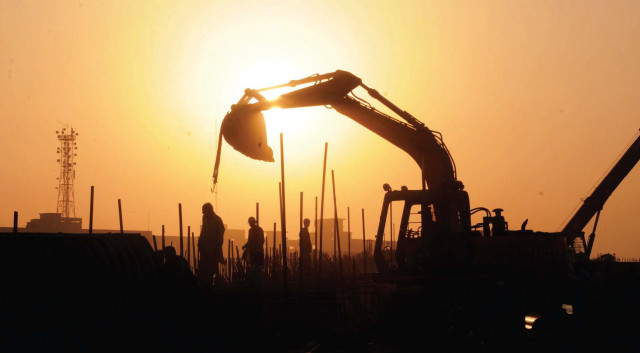Pakistan’s construction industry – the hot cake for foreign investors
Country needs to eliminate bottlenecks in growth of the developing industry.

PHOTO: AFP
It has been estimated that output of the sector has a significant share of 40-60% in gross fixed capital formation. Moreover, studies have suggested that more than 60 other associated industries form linkages with the construction and housing industry.
This makes the sector pivotal to economic development as it is crucial for providing shelter, employment and infrastructure.
The construction industry is playing an important role in economic growth of Pakistan. Recent (provisional) estimates published in the Economic Survey of Pakistan show that the industry grew 9.1% in FY17 and contributed 2.7% to the country’s gross domestic product (GDP).
BMI Research has also provided a healthy growth outlook for the sector, putting it at 11.8% annually from 2016-20 and 9.1% over 2016-25.
The signing of the China-Pakistan Economic Corridor (CPEC) agreement and improvement in the country’s security situation have been the key to giving boost to not only the construction industry, but Pakistan’s image abroad. With China having the first-mover advantage in injecting foreign investment into the country, other countries have followed suit.
The sector has also been an important recipient of foreign direct investment (FDI). This can be judged from the latest figures provided by the State Bank of Pakistan, which show that the construction industry received a net inflow of $35.7 million in August 2017.
How attractive the industry is perceived to be for foreign investors can be gauged from the fact that in the current fiscal year from July-August FY18 the industry has received $55.7 million relative to $1.6 million in the same period of last year.
Locally, investment has also been boosted by government policies such as reduction in duties and taxes on building materials like steel, construction machinery and equipment and computerisation of land ownership records.
Infrastructure igniting innovation
Future of construction
Despite the stellar performance of the industry over the past few years, certain risks remain. These include an uncertain outlook on the political front, widespread corruption in the industry and a poor economic and business climate.
There is also much to learn from other countries such as the United Kingdom where the performance of the construction industry is a barometer for overall economic health. The importance of the industry for the overall GDP can be judged from the fact that output of the construction industry was estimated to be 6.5% of GDP in 2014.
A conference titled “Skills Shortage in Construction: Building the Future Post-Brexit” was organised by the Bartlett School of Construction and Project Management, UCL in collaboration with History and Policy on Oct 5, 2017.
The conference brought together eminent historians, academics, civil servants and practitioners to discuss the current challenges the construction industry faces and find areas where proactive policy can robustly respond to the challenges and ensure that the sector achieves its full potential.
One of the central themes of the conference was to ensure that the construction industry did not face any skills shortage. With the onset of automation and its inroads into advanced economies, a different skillset is required to take the industry forward in the future.
Conference participants stressed the need for critical thinking about the effectiveness of existing educational and training arrangements to meet skills shortages in the future.
Besides infrastructure, Pakistan must also seek capital for export industries
Developing stage
The construction industry is in a developing stage in Pakistan. There is an urgent need to eliminate bottlenecks such as corrupt practices in the industry, carry out extensive computerisation of land ownership records for greater transparency, improve land regulation and building control, standardise and implement building laws across the board and impart latest skills to students for the future of the industry.
The last session of the conference focused on how the industry was being automated in today’s world using digital tools for manufacturing, design and assembly. It also focused on the implications that automation would have for the nature of professional work and education, demand and supply of construction professionals.
The writer is a doctoral candidate at The
Bartlett, UCL
Published in The Express Tribune, October 23rd, 2017.
Like Business on Facebook, follow @TribuneBiz on Twitter to stay informed and join in the conversation.



















COMMENTS
Comments are moderated and generally will be posted if they are on-topic and not abusive.
For more information, please see our Comments FAQ